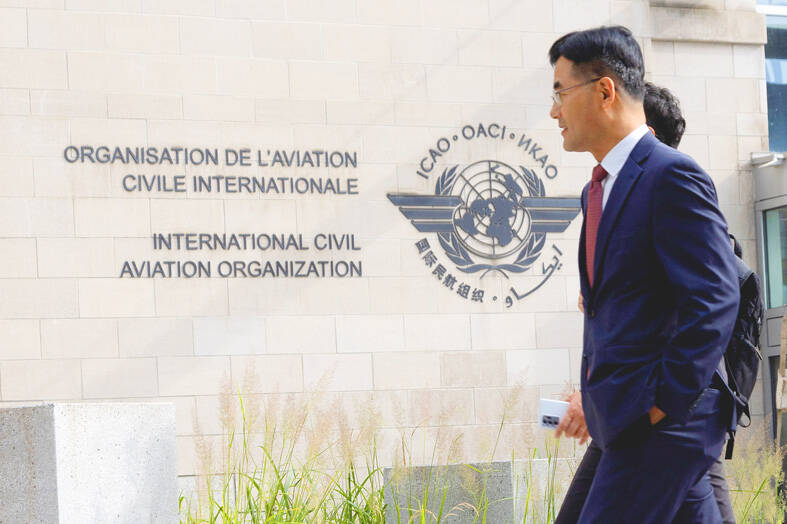Twenty-eight members of the European Parliament have sent a joint letter to leaders of the International Civil Aviation Organization (ICAO) and the EU to express concern over China’s unilateral decision to alter the M503 flight path.
The letter, which was sent on Wednesday last week, was addressed to ICAO Council President Salvatore Sciacchitano, European Commission President Ursula von der Leyen, European Council President Charles Michel, EU High Representative for Foreign Affairs and Security Policy Josep Borrell, European Commissioner for Climate Action Frans Timmermans and European Commissioner for Transport Adina Valean.
Jan-Christoph Oetjen, vice president of the European Parliament and vice chair of the Committee on Transport and Tourism, posted the letter on X yesterday, calling on the ICAO to “take immediate action.”

Members of the International Civil Aviation Organization arrive at the agency’s headquarters in Montreal on Oct. 1, 2022.
Photo: Reuters
Beijing on Jan. 30 announced changes to the M503 flight path, breaking its agreement with Taiwan that southbound flights on the route should operate 6 nautical miles (11km) southwest of the route.
Two days later, it commenced the W122 and W123 eastbound routes, which the two sides had agreed not to launch before confirming the details of their implementation.
Carrying out the changes without prior consultation with Taiwan “are in direct violation of established agreements between the two sides,” the letter said.
The actions also contravened section 4.2.6 of the ICAO’s Air Traffic Services Planning Manual, which stipulates that establishing and changing flight routes should be made “only after they have been coordinated with all parties concerned,” it said.
The letter said that China’s moves “are politically motivated,” as they were taken shortly after Taiwan completed its presidential and legislative elections on Jan. 13, and “without tangible evidence to demonstrate there are real traffic issues to be addressed.”
“This raises concerns about aviation infrastructure being used as a tool for geopolitical pressure,” it said.
Making the alterations unilaterally posed risks to regional stability and predictability, “potentially leading to misunderstandings and escalations” across the Taiwan Strait, it added.
Launching new routes would also “challenge air traffic management and raise the likelihood of incidents or accidents,” it said.
The disregard for Taiwan’s interests further hinders the nation’s participation in the ICAO, which “not only undermines Taiwan’s rights, but also hampers global efforts to ensure aviation safety,” the letter said.
The parliamentarians called for actions from the ICAO to “ensure compliance with established regulations and agreements.”
“It is essential to uphold the principles of transparency, cooperation, and respect for international norms in the management of civil aviation,” the letter added.
In Taipei, the Ministry of Foreign Affairs yesterday thanked the parliamentarians for expressing concern over the issue.
The signatories include members of four major parties in the European Parliament — the European People’s Party, Renew Europe, the European Conservatives and Reformists and the Greens/EFA Group — which showed that clear consensus exists in the parliament regarding China’s unilateral behavior and support for peace and stability in the Taiwan Strait, the ministry said in a press release.
Source: Taipei Times - 2024/03/20




















